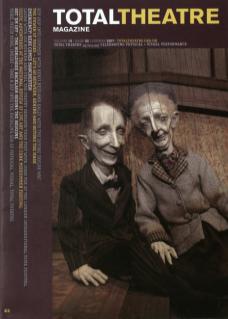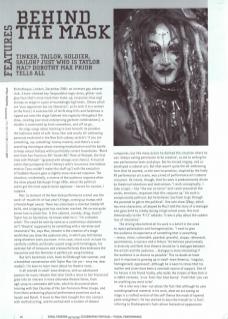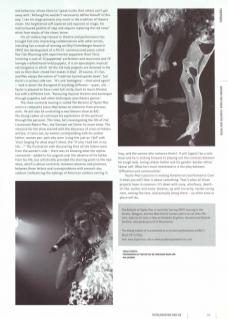Bistrotheque, London, December 2006: an intimate gay cabaret club. A bare-chested boy (leopard skin toga-dress, glitter-and glue face that's more mask than make-up, turquoise blue wig) stomps on stage in a pair of exceedingly high heels. (Shoes which are 'your oppression but my liberation', as he tells it to a woman at the front.) A suitcase full of thrift shop frills and fur belows is tipped out onto the stage (delved into regularly throughout the show, creating ever more enterprising garment combinations), a ukulele is summoned up from somewhere, and off we go...
He sings songs about learning to love himself; he parodies the ludicrous state of soft-focus fear and woolly all-embracing paranoia enshrined in the New York subway system's 'if you see something, say something' tannoy mantra; and there's a soul-searching monologue about morning masturbation and the battle to keep sexual fantasy within politically correct boundaries: 'Black men from San Francisco NO! Twinks NO! Think of Michael, the first time with Michael!' (greeted with whoops and cheers). A musical satire that juxtaposes Dick Cheney's wife's incursions into lesbian erotica (‘you couldn't make this stuff up') with the execution of Saddam Hussein gets a slightly more reserved response. The situation, incidentally, a reverse of the audience response when the show played Edinburgh Fringe 2006, where the political satire got the most appreciative applause – horses for courses, I suppose.
Mac (a stalwart of the New York performance scene) was the word-of-mouth hit of last year's Fringe, coming up trumps with a Herald Angel award. There has since been a slow but steady UK build, and a tipping point has now been reached. Yet no one quite knows how to place him. Is this cabaret, comedy, drag, music? Taylor has no hesitation, he knows what he is: 'I'm a theatre artist.' This could be seen by some as a contentious statement. Isn't 'theatre' supposed to be something with a narrative and characters? No, says Mac, theatre is the creation of a stage world that you draw the audience into, in which you tell stories using whatever tools you have: in his case, those tools include his carefully crafted, politically sussed songs and monologues, his suitcase full of treasures and a beautiful body that embraces the masculine and the feminine in perfect yin-yang harmony.
But let's backtrack a bit, back to Edinburgh last summer, and a breakfast conversation with Taylor Mac (oh yes – envy me, dear reader). I'm keen to learn more about his theatre roots...
It all started in small-town America, with an adolescent passion for music theatre that later (with a move to San Francisco) grew into an interest in more alternate theatre forms, from agit-prop to commedia dell'arte, which he discovered when training with Dan Chumley of the San Francisco Mime troupe, and from there embracing physical performance practices such as Suzuki and Butoh. A move to New York brought him into contact with method acting, and he worked with a number of theatre companies, but like many actors he disliked the situation where he was 'always asking permission to be creative', so set to writing his own performance texts and plays. But he missed singing, and so developed a cabaret act. But that wasn't quite the all-embracing form that he wanted, so the next incarnation, inspired by the lively NY performance art scene, was a kind of performance art / cabaret crossover. He insists, though, that his work is predominantly driven by theatrical intentions and motivations: 'I work conceptually. I take a topic – like "the war on terror" and I work around all the words, emotions, responses that this conjures up.' His work is unequivocally political, but he believes you have to ‘go through the personal to get to the political'. One solo show (Okay, which has nine characters, all played by Mac) told the story of a teenager who gave birth to a baby during a high school prom, this tied thematically to the '9/11' attacks: 'it was a play about the sudden loss of innocence'.
The driving idea behind all his work is a belief in the need to reject polarisation and homogenisation. 'I want to give the audience an experience of something that is everything – messy, clean, vulnerable, guarded, graceful, sloppy, rehearsed, spontaneous, a success and a failure.' He believes passionately in diversity and feels that theatre should be 'a dialogue between the artists and the audience... dialogue is more interesting if the audience is as diverse as possible.' This no doubt at least part in response to growing up in small-town America, 'singular, homogenised, oppressed', although he is keen to stress that his mother and sister have been a constant source of support. One of his heroes is his friend Scotty, who walks the streets of New York in a rabbit costume, 'a six-foot-four blue bunny'. Proof that you can ‘be anything you want to be'.
He is also very clear-cut about the fact that although he uses autobiographical material in his work, what we are seeing on stage is a crafted version of the self (hence the mask of layered paint and glitter). He has started to describe himself as 'a fool', referring to Shakespeare's fools whose fantastical appearance and behaviour allows them to ‘speak truths that others can't get away with.' Although he wouldn't necessarily define himself in this way, I see his stage persona very much in the tradition of theatre clown: the heightened self explored and exposed on stage; his multicoloured palette of slap and sequins replacing the red nose / white face masks of the clown/mime.
His all-embracing interest in theatre and performance has brought him into interesting collaborations with other artists, including (as a result of winning an Ethyl Eichelberger Award in 2005) the development of a PS122-commissioned piece called Red Tide Blooming with experimental puppeteer Basil Twist. Involving a cast of twelve puppeteer-performers and musicians and twenty lovingly crafted hand-held puppets, it is an apocalyptic musical extravaganza in which ‘all the old lady puppets are drowned in the sea so their blue-rinsed hair makes it blue'. Of course, it's fun, and Mac enjoys the notion of 'tradition turned upside down', but there's a serious side too: 'It's anti homogeny' – that word again! – 'and is about the disregard of anything different – queer, old...’ Taylor is pleased to have come full circle, back to music theatre but with a different kick: 'honouring musical theatre and burlesque through puppetry and other techniques and theatre genres'.
The show currently touring is called The Be(a)st of Taylor Mac and is a composite piece that draws on elements from previous work. He will also be scratching a new theatre show at BAC. The Young Ladies Of continues his exploration of the political through the personal. This time, he's investigating the life of 2nd Lieutenant Robert Mac, the Vietnam vet father he never knew. The research for the show started with the discovery of a box of letters written, it turns out, by women corresponding with his soldier father: women pen-pals who were 'using him just as I did' with their longing for what wasn't there, the ‘if only I had him in my life...’ The frustration with discovering that all the letters were from the women's side – there was no knowing what the replies contained – added to his anguish over the absence of his father from his life, but artistically provided the starting point to the new show, which is about contrasts: between absence and presence, between these letters and correspondence with present-day soldiers (referencing the weblogs of American soldiers serving in Iraq, and the women who romance them). It will (again) be a solo show and he is looking forward to playing out the contrast between his tough lady-loving soldier father and his gender-bender leftie/liberal self. What he's most interested in is the play between 'difference and commonality'.
Taylor Mac's passion is making theatre/art/performance (call it what you will) that is about something. That's what all these projects have in common: it's down with irony, aloofness, death-of-the-author and meta-theatre; up with sincerity, tender loving care, owning the text, and actually being there – no other time or place will do.


